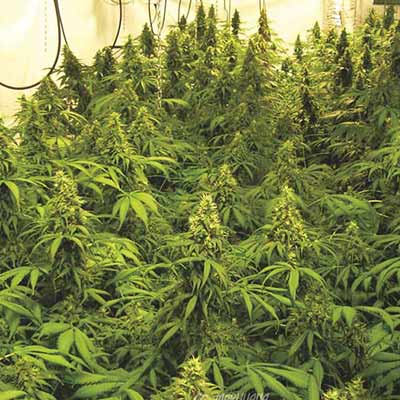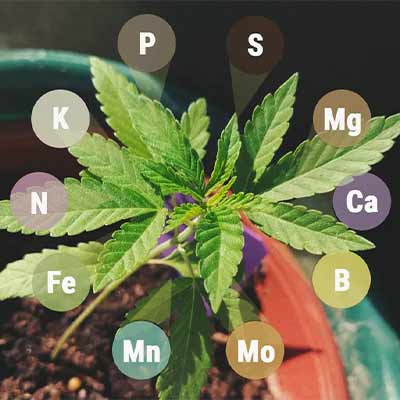BackUnderstanding Cannabis Nutrients for Better Yields
01.08.2025

Healthy cannabis plants rely on more than genetics and lighting. The key to strong growth and high yields is providing the right nutrients at the right time. By learning how nutrients work, what types cannabis needs, and how to balance them, growers can ensure vigorous plants and abundant harvests.
Why Nutrients Are Essential for Cannabis Growth
Nutrients are the backbone of cannabis development. They support photosynthesis, root formation, and bud production. Without proper nutrition, plants become weak, less resistant to stress, and produce lower-quality flowers. Supplying the best nutrients for growing cannabis promotes resilience, potency, and flavor.
How Nutrients Affect Plant Health and Yield
The amount and type of cannabis grow nutrients directly impact plant health. Adequate feeding results in lush leaves, strong stems, and dense buds coated with trichomes. Poor nutrition, on the other hand, slows growth and reduces cannabinoid levels, lowering the final yield.
Common Signs of Nutrient Deficiencies in Cannabis
Recognizing deficiencies early helps save crops. Yellowing leaves often indicate nitrogen issues, while brown spots suggest calcium deficiency. Curled leaf edges, pale new growth, or slow development are other warning signs. Quick diagnosis and correction are essential to prevent damage.
Essential Nutrients for Cannabis Plants
Cannabis needs both macronutrients and micronutrients. Each element plays a specific role in growth and flowering.
Macronutrients: Nitrogen (N), Phosphorus (P), and Potassium (K)
These primary elements drive plant performance:
- Nitrogen (N): Crucial during vegetative growth, boosting leaf and stem formation.
- Phosphorus (P): Supports root development and energy transfer, vital for bud growth.
- Potassium (K): Enhances disease resistance, strengthens stems, and improves flower density.
Micronutrients: Calcium, Magnesium, Iron, and More
Even in small amounts, these nutrients are essential:
- Calcium: Builds cell walls and aids root expansion.
- Magnesium: Key for photosynthesis and chlorophyll creation.
- Iron: Assists with enzyme function and chlorophyll synthesis.
- Others: Zinc, manganese, boron, and copper also support healthy growth.
Organic vs. Synthetic Nutrients – What’s Best for Cannabis?
Growers often debate organic versus synthetic fertilizer. Organic options, like compost and worm castings, improve soil structure and feed beneficial microbes. Synthetic nutrients offer fast results and precise dosing but require careful monitoring. Many growers combine both to achieve balance.
How to Balance Nutrients for Optimal Cannabis Growth
Maintaining balance prevents deficiencies and toxicities. Overfeeding burns roots, while underfeeding starves plants. Correct balance ensures steady growth and optimal flower formation.
Understanding pH Levels and Nutrient Uptake
pH is critical for nutrient absorption. In soil, keep pH between 6.0 and 7.0. In hydroponics, aim for 5.5–6.5. Out-of-range pH causes nutrient lockout, where plants cannot access available elements despite proper feeding.
Feeding Schedules for Different Growth Stages (Vegetative & Flowering)
Cannabis needs change during its lifecycle. In the vegetative phase, high nitrogen levels encourage leafy growth. During flowering, reduce nitrogen and increase phosphorus and potassium to boost bud formation. Always follow feeding charts and adjust based on plant response.
Common Nutrient Problems and How to Fix Them
Even with care, nutrient issues can arise. Quick action minimizes damage and restores plant health.
Nutrient Lockout – Causes and Solutions
Lockout occurs when salts accumulate or pH is off, blocking nutrient uptake. The solution is to flush the medium with pH-corrected water and reset your feeding routine to restore absorption.
Overfeeding vs. Underfeeding – Finding the Right Balance
Overfeeding shows as burnt leaf tips and dark green foliage. Underfeeding leads to pale leaves and weak growth. The safest approach is to start with lower doses and gradually increase as plants mature.
Conclusion: Maximizing Cannabis Yields with Proper Nutrition
Correct nutrient management ensures vigorous growth, resistance to stress, and abundant, high-quality harvests. Whether you prefer organic compost or synthetic fertilizer, consistency and balance are key to success.
Best Practices for a Healthy and Productive Grow
- Check pH regularly to prevent lockout.
- Adjust feeding schedules to plant stages.
- Watch leaves for early deficiency signs.
- Experiment with nutrient brands to find your best fit.
With the right nutrient strategy, your cannabis plants will thrive and deliver top-tier yields.

